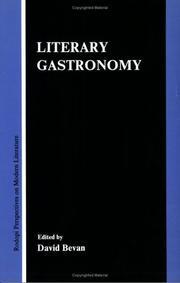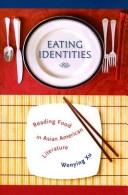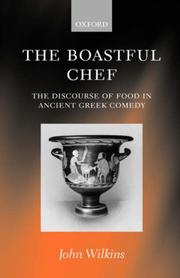| Listing 1 - 8 of 8 |
Sort by
|

ISBN: 8420620424 9788420620428 Year: 1979 Volume: 42 3 Publisher: Madrid: Alfaguara,
Abstract | Keywords | Export | Availability | Bookmark
 Loading...
Loading...Choose an application
- Reference Manager
- EndNote
- RefWorks (Direct export to RefWorks)
Cookery --- -Cookery --- -Cookery in literature --- Cookery, Spanish --- Gastronomy in literature --- Spanish cooking --- Cookery in literature --- Cooking in literature --- Cooking, Spanish --- Cooking --- Cuisine --- Food preparation --- Home economics --- Cookbooks --- Dinners and dining --- Food --- Gastronomy --- Table --- Cervantes Saavedra, de, Miguel --- Cooking in literature. --- Cooking, Spanish. --- Gastronomy in literature. --- Cookery in literature. --- Cookery, Spanish. --- Spanje --- geschiedenis. --- Food science --- Geschiedenis. --- Cooking - Spain - Castile --- Cooking - Spain - Mancha

ISBN: 9051830629 Year: 1988 Volume: vol 1 Publisher: Amsterdam Atlanta Rodopi
Abstract | Keywords | Export | Availability | Bookmark
 Loading...
Loading...Choose an application
- Reference Manager
- EndNote
- RefWorks (Direct export to RefWorks)
Comparative literature --- Thematology --- Food in literature --- Literature, Modern --- -Gastronomy in literature --- Modern literature --- Arts, Modern --- History and criticism --- Gastronomy in literature --- Cookery in literature --- Addresses, essays, lectures --- Gastronomie dans la litterature --- Habitudes alimentaires dans la litterature --- Nourriture dans la litterature
Book
ISBN: 8815031782 Year: 1991 Publisher: Bologna Mulino
Abstract | Keywords | Export | Availability | Bookmark
 Loading...
Loading...Choose an application
- Reference Manager
- EndNote
- RefWorks (Direct export to RefWorks)
Cooking in literature --- Dinners and dining in literature --- Food habits in literature --- Food in literature --- Gastronomy in literature --- Italian fiction --- Cookery in literature --- History and criticism --- Italian literature --- anno 1900-1999
Book
ISBN: 147983842X 9781479838424 9781479830213 1479830216 Year: 2014 Publisher: New York, NY
Abstract | Keywords | Export | Availability | Bookmark
 Loading...
Loading...Choose an application
- Reference Manager
- EndNote
- RefWorks (Direct export to RefWorks)
Whether a five-star chef or beginning home cook, any gourmand knows that recipes are far more than a set of instructions on how to make a dish. They are culture-keepers as well as culture-makers, both recording memories and fostering new ones.Organized like a cookbook, Books That Cook: The Making of a Literary Meal is a collection of American literature written on the theme of food: from an invocation to a final toast, from starters to desserts. All food literatures are indebted to the form and purpose of cookbooks, and each section begins with an excerpt from an influential American cookbook, progressing chronologically from the late 1700s through the present day, including such favorites as American Cookery, the Joy of Cooking, and Mastering the Art of French Cooking. The literary works within each section are an extension of these cookbooks, while the cookbook excerpts in turn become pieces of literature—forms of storytelling and memory-making all their own.Each section offers a delectable assortment of poetry, prose, and essays, and the selections all include at least one tempting recipe to entice readers to cook this book. Including writing from such notables as Maya Angelou, James Beard, Alice B. Toklas, Sherman Alexie, Nora Ephron, M.F.K. Fisher, and Alice Waters, among many others, Books That Cook reveals the range of ways authors incorporate recipes—whether the recipe flavors the story or the story serves to add spice to the recipe. Books That Cook is a collection to serve students and teachers of food studies as well as any epicure who enjoys a good meal alongside a good book.
Cooking. --- Cooking in literature. --- Food in literature. --- Cookery in literature --- Cookery --- Cuisine --- Food preparation --- Food science --- Home economics --- Cookbooks --- Dinners and dining --- Food --- Gastronomy --- Table --- SOCIAL SCIENCE / Anthropology / Cultural & Social.
Book
ISBN: 9789867712301 9867712307 Year: 2007 Publisher: 臺北 大安出版社
Abstract | Keywords | Export | Availability | Bookmark
 Loading...
Loading...Choose an application
- Reference Manager
- EndNote
- RefWorks (Direct export to RefWorks)
Chinese poetry --- Cooking, Chinese. --- Cooking in literature. --- History and criticism. --- LSIN --- S21/0600 --- S04/0650 --- China: Medicine, public health and food--Chinese food and cookery, (incl. tea) --- China: History--Song, Liao, Jin: 960 - 1278 --- History and criticism --- Cooking, Chinese --- Cooking in literature --- Cookery in literature --- Chinese cooking --- Cookery, Chinese

ISBN: 0824862287 1435666771 0824878434 0824831950 Year: 2007 Publisher: Honolulu University of Hawai'i Press
Abstract | Keywords | Export | Availability | Bookmark
 Loading...
Loading...Choose an application
- Reference Manager
- EndNote
- RefWorks (Direct export to RefWorks)
The French epicure and gastronome Brillat-Savarin declared, "Tell me what you eat, and I will tell you who you are." Wenying Xu infuses this notion with cultural-political energy by extending it to an ethnic group known for its cuisines: Asian Americans. She begins with the general argument that eating is a means of becoming—not simply in the sense of nourishment but more importantly of what we choose to eat, what we can afford to eat, what we secretly crave but are ashamed to eat in front of others, and how we eat. Food, as the most significant medium of traffic between the inside and outside of our bodies, organizes, signifies, and legitimates our sense of self and distinguishes us from others, who practice different food ways. Narrowing her scope, Xu reveals how cooking, eating, and food fashion Asian American identities in terms of race/ethnicity, gender, class, diaspora, and sexuality. She provides lucid and informed interpretations of seven Asian American writers (John Okada, Joy Kogawa, Frank Chin, Li-Young Lee, David Wong Louie, Mei Ng, and Monique Truong) and places these identity issues in the fascinating spaces of food, hunger, consumption, appetite, desire, and orality. Asian American literature abounds in culinary metaphors and references, but few scholars have made sense of them in a meaningful way. Most literary critics perceive alimentary references as narrative strategies or part of the background; Xu takes food as the central site of cultural and political struggles waged in the seemingly private domain of desire in the lives of Asian Americans. Eating Identities is the first book to link food to a wide range of Asian American concerns such as race and sexuality. Unlike most sociological studies, which center on empirical analyses of the relationship between food and society, it focuses on how food practices influence psychological and ontological formations and thus contributes significantly to the growing field of food studies. For students of literature, this tantalizing work offers an illuminating lesson on how to read the multivalent meanings of food and eating in literary texts.
American literature --- Gastronomy in literature. --- Food habits in literature. --- Dinners and dining in literature. --- Cooking in literature. --- Asian Americans --- Asian Americans in literature. --- Food habits --- Asian American authors --- History and criticism. --- Intellectual life. --- Social aspects. --- Cookery in literature --- Asians --- Ethnology --- Literature --- Ethnic group --- Masculinity

ISBN: 019924068X Year: 2000 Publisher: Oxford Oxford University Press
Abstract | Keywords | Export | Availability | Bookmark
 Loading...
Loading...Choose an application
- Reference Manager
- EndNote
- RefWorks (Direct export to RefWorks)
Thematology --- Classical Greek literature --- Drama --- Greek drama (Comedy) --- Dinners and dining --- Food habits --- Dinners and dining in literature. --- Cookery --- Cooks in literature. --- Comédie grecque --- Repas --- Habitudes alimentaires --- Repas dans la littérature --- History and criticism. --- History. --- History --- Histoire et critique --- Histoire --- Comédie grecque --- Repas dans la littérature --- Cooking in literature --- Cooking --- Cooks in literature --- Dinners and dining in literature --- Food habits in literature --- Gastronomy in literature --- Eating --- Food customs --- Foodways --- Human beings --- Habit --- Manners and customs --- Diet --- Nutrition --- Oral habits --- Banquets --- Dining --- Meals --- Caterers and catering --- Entertaining --- Etiquette --- Gastronomy --- Menus --- Table --- Cuisine --- Food preparation --- Home economics --- Cookbooks --- Food --- Cookery in literature --- History and criticism --- Cooking, Greek. --- Food science
Book
ISBN: 0820706248 9780820706245 0820704954 Year: 2016 Publisher: University Park Penn State University Press
Abstract | Keywords | Export | Availability | Bookmark
 Loading...
Loading...Choose an application
- Reference Manager
- EndNote
- RefWorks (Direct export to RefWorks)
"Essays discuss food and drink in Shakespeare's plays, reframing questions about cuisine, eating, and meals in early modern drama and emphasizing the aesthetic, communal, and philosophical aspects of food; many issues in Shakespeare studies are thus considered in terms of the cultural marker of culinary dynamics"--
Food habits --- Cooking in literature --- Drinking customs in literature --- Food habits in literature --- Food in literature --- Cookery in literature --- Eating --- Food customs --- Foodways --- Human beings --- Habit --- Manners and customs --- Diet --- Nutrition --- Oral habits --- History --- Shakespeare, William, --- Shakespeare, William --- Shakespear, William, --- Shakspeare, William, --- Šekʻspiri, Uiliam, --- Saixpēr, Gouilliam, --- Shakspere, William, --- Shikisbīr, Wilyam, --- Szekspir, Wiliam, --- Šekspyras, --- Shekspir, Vilʹi︠a︡m, --- Šekspir, Viljem, --- Tsikinya-chaka, --- Sha-shih-pi-ya, --- Shashibiya, --- Sheḳspir, Ṿilyam, --- Shaḳspir, Ṿilyam, --- Syeiksŭpʻio, --- Shekspir, V. --- Szekspir, William, --- Shakespeare, Guglielmo, --- Shake-speare, William, --- Sha-ō, --- Şekspir, --- Shekspir, Uiliam, --- Shekspir, U. --- Šekspir, Vilijam, --- Ṣēkspiyar, Viliyam, --- Shakspir, --- Shekspyr, Vyli︠e︡m, --- Şekspir, Velyam, --- Ṣēkspiyar, Villiyam, --- Shēkʻspʻiyr, Vlilliam, --- Ṣēkspiyar, --- Ṣēkspiyar Mahākavi, --- Ṣēkspiyar Mahākaviya, --- Sheḳspier, Ṿilyam, --- Shēkʻspir, --- Shakespeare, --- Śeksper, --- Шекспир, Вильям, --- Шекспир, Уильям, --- שייקספיר, וויליאם, --- שייקספיר, וו., --- שיקספיר, וויליאם --- שיקספיר, ויליאם --- שיקספיר, ויליאם, --- שכספיר, ויליאם, --- שכספיר, וילים, --- שכספיר, ו׳ --- שעפקספיר, וויליאם, --- שעקספיער, וויליאם --- שעקספיער, וויליאם, --- שעקספיער, ווילליאם --- שעקספיער, וו., --- שעקספיר --- שעקספיר, וו --- שעקספיר, וויליאם, --- שעקספיר, וויליאמ --- שעקספיר, ווילליאם --- שעקספיר, ווילליאם, --- שעקספיר, וו., --- שעקספיר, װיליאם, --- שעקספיר, װילליאם, --- שעקספיר, װ., --- שעקספער --- שעקספער, וויליאמ --- שקספיר --- שקספיר, וו --- שקספיר, וויליאם --- שקספיר, וויליאם, --- שקספיר, ווילים, --- שקספיר, וילאם --- שקספיר, ויליאם --- שקספיר, ויליאם, --- שקספיר, ויליים, --- שקספיר, וילים --- שקספיר, וילים, --- شاكسبير، وليم --- شاكسپير، وليم --- شكسبير، وليام --- شكسبير، وليم --- شكسبير، وليم، --- شكسبير، و. --- شكسپير، وليم --- شكسپير، ويليام --- شيكسبير، وليام --- شيكسبير، وليام.، --- شيكسبير، وليم --- شکسبير، وليم --- وليم شکسبير --- 沙士北亞威廉姆, --- 沙士比亞威廉姆, --- 莎士比亞威廉姆, --- 莎士比亞威廉, --- 莎士比亞, --- Knowledge --- Manners and customs. --- COOKING / History. --- LITERARY CRITICISM / Renaissance. --- LITERARY CRITICISM / Shakespeare. --- Cooking in literature. --- Drinking customs in literature. --- Food habits in literature. --- Food in literature. --- Knowledge and learning. --- Ceremonies --- Customs, Social --- Folkways --- Social customs --- Social life and customs --- Traditions --- Usages --- Civilization --- Ethnology --- Etiquette --- Rites and ceremonies
| Listing 1 - 8 of 8 |
Sort by
|

 Search
Search Feedback
Feedback About UniCat
About UniCat  Help
Help News
News